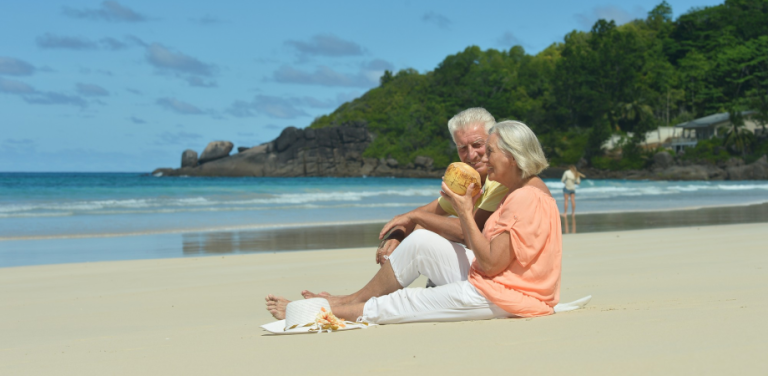Retirement in the Philippines: Planning Your Golden Years
25 November 2024

Key fact: The retirement age in the Philippines begins at 60 and becomes compulsory at 65.
If you’re planning to move to the Philippines for your retirement, there are things you’ll need to get in order before you even get on a plane.
There are many ways to build your retirement fund in the Philippines. Let’s take a look at some of them.
Building your Retirement Fund
Personal Equity Retirement Account (PERA)
You might receive a large lump sum from a pension plan, but it won’t necessarily cover all your expenses. Leaving your money in a regular savings account may not deliver the best returns.
PERA accounts offer several advantages, including tax benefits. One major benefit is the ability to withdraw your investments tax-free.
Variable Universal Life (VUL) Insurance
Insurance policies are now much more comprehensive than they used to be. These days, they often cover more than just death, illness or disability. Many now come with investment benefits as well.
With VUL insurance, you get both financial security and the potential for passive income. Premiums are invested in a mix of bonds and stocks, meaning your money can continue to grow during retirement in the Philippines.
You can also read our blog on health insurance in the Philippines for more information on this topic.
Real Estate Investment
When done carefully, investing in real estate can provide excellent financial upside. Buying property and renting it out gives you a source of passive income. Most property appreciates over time, making real estate an attractive long-term investment.
Investment Funds
Stocks, bonds and mutual funds can all be great options. They tend to yield higher returns over time than traditional bank accounts, but they do require more financial knowledge and experience.
These ideas should be considered suggestions only. For the best advice on maximising your retirement funds, speak to a qualified financial advisor.
Getting Your Visa
Securing your visa for retirement in the Philippines can be a complicated process. You’ll need to obtain a Special Resident Retiree’s Visa (SRRV), which requires you to:
– Be at least 50 years old
– Deposit at least $10,000 in a Philippine bank (if you have guaranteed monthly income)
– Deposit $15,000 for each additional dependent
– Provide proof of pension that pays at least $800 a month, or $1,000 for couples
When we say “pension”, this refers to most forms of retirement income, including social security benefits.
Visa costs:
– Application fee: $1,400, plus $300 for each additional family member
– Annual renewal fee: $360 (covers you, your spouse and one child)
– Additional children: $100 each
You’ll also need an Alien Certificate of Registration (ACR-I) card, which stores your biometric data and fingerprints. This acts as your re-entry permit when used with your passport. It costs $50 and must be renewed each year.
All quoted prices are accurate at the time of publication and are subject to change.
Lifestyle for Your Retirement in the Philippines
Cost of Living
Broadly speaking, the cost of living in the Philippines is much lower than in Australia. Housing, food, transportation and healthcare are all more affordable, especially in rural areas, but even in major cities.
Healthcare
Healthcare is of higher quality in major cities, but can be limited in rural areas, where there may be fewer doctors and some services unavailable.
Infrastructure
Rural areas may lack reliable facilities such as electricity and a steady water supply, while major cities have more robust infrastructure.
Housing
There are many housing options for retirees. You could choose a modern condominium in a city or a traditional house in the countryside. Renting or buying property is generally more affordable than in Australia.
Expat Communities
Some retirees enjoy living among fellow expats. The Philippines has many established expat communities that offer a sense of familiarity and support.
Culture
If you’d rather immerse yourself in Filipino culture, you’ll find a rich heritage of traditions, festivals and historic sites. Dining out is a big part of local life – many dishes are eaten by hand. Be aware that in some situations, using your left hand to eat can be seen as impolite.
Leisure
Australia’s beaches may be hard to leave behind, but the Philippines is home to some of the most stunning beaches in the world. The islands and natural landscapes are perfect for swimming, diving and hiking.
Language
English is widely spoken, though learning a local dialect can be helpful.
Climate
The Philippines has a tropical climate, similar to northern Australia. It’s perfect for beach lovers. Just be sure to research typhoon season – some areas are affected more than others.
Considerations for Retirement in the Philippines
Some of these points will apply to those moving soon, others to those planning for the future. They should be treated as considerations only. For personalised guidance, speak to a financial advisor.
– Create multiple income sources: Income is often more limited in retirement. Inflation, health costs and daily expenses can all rise, so having several streams of income can help.
– Invest or save?: Investments can deliver strong returns if managed well, but always carry more risk than saving.
– Consider inflation: Plan for rising costs, not just current prices. Tools like the WorldData calculator or the Philippines Inflation Calculator can help you estimate future expenses.
– Prioritise health: Taking care of your health early can make your retirement much more comfortable.
Conclusion
Retiring in the Philippines is appealing for many people because of the low cost of living, stunning landscapes and range of lifestyle options. If you get your investments right, manage your money carefully and look after your health, it can be a truly rewarding place to enjoy your golden years.
To learn more about the Philippines, read our other blogs on the country, including how to make large transfers. You can also use e-Pocket to transfer money to the Philippines quickly and securely.




